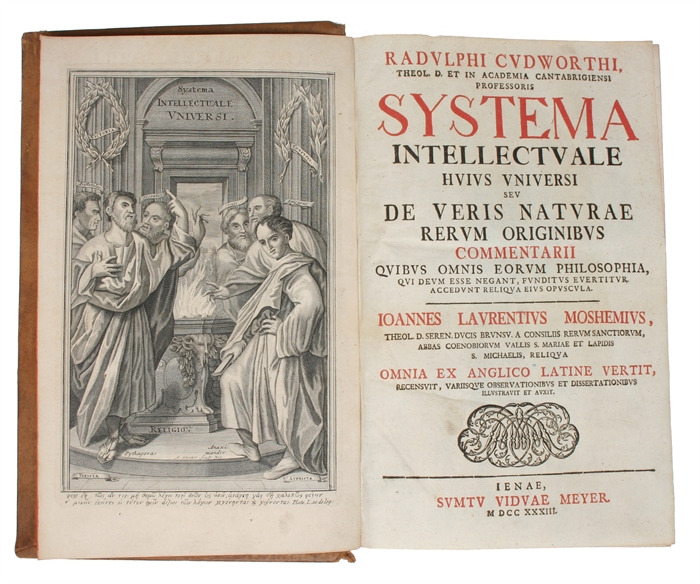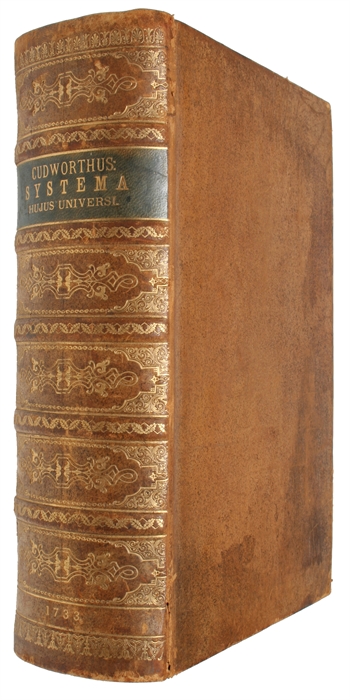THE "PLASTIC MEDIUM"
CUDWORTH, RADULPH (RALPH).
Systema Intellectuale huius Universi seu de Veris Naturae rerum originibus Commentarii qvibus omnis eorum Philosophia, qvi Deum esse negant, funditus evertitur. Accedunt Reliqua eius Opuscula. Joannes Lavrentius Moshemius, Omnia ex Anglico Latine vertit. (Five works in two volumes).
Jena, Vidvae Meyer, 1733. Folio. Cont. full calf w. richly gilt back. A bit of wear to extremities, but a very nice and clean copy. Beautiful vignettes and woodcut initials at beginning, as well as woodcut end-vignettes to the larger sections. Title-page printed in red and black. Engraved portrait-frontispiece, engraved frontispiece (depicting Aristotle, Socrates, Strato, Epicur, Anaximander and Pythagoras), (69), 1206; 1 blank leaf, (8), 88; 47, (1); (16), 42; (8), 25, (1); (52, -Index) pp.
First Latin edition of Cudworth's main work, "The true Intellectual System of the World" from 1678.
The English philosopher Ralph Cudworth (1617- 1688) was the leader of the Cambridge Platonists. In 1678 he published parts of his main work, the "Intellectual System", which, according to Cudworth himself, arose out of a discourse refuting determinism, or, as he put it, "fatal necessity". Cudworth set out to prove three matters that together constitute the intellectual system of the universe (in opposition to the physical), namely the existence of God, the naturalness of moral distinctions, and the reality of human freedom, thereby disproving atheism, religious fatalism, and the fatalism of the Stoics. In his criticism of materialistic atheism, Cudworth principally aimed at Hobbes, who he necessarily had to refute. Apart from his great attempt to refute atheism and all the philosophers that he could connect with it, a much discussed part of the book is that in which he introduces his conception of the "Plastic Medium", which is supposed to explain the laws of nature without referring everything directly back to God, and which very much resembles Plato's "World-Soul". This "Plastic Medium" resulted in long philosophic controversies.
"His [Cudworth's] most important work, The true Intellectual System..., is a fragment of an even larger work he had planned to refute materialism of Epicurus and of Thomas Hobbes. Cudworth believed that a "rightly understood" mechanical and corpuscular philosophy did not destroy traditional religion but instead offered it new support. If matter was inert and utterly passive, then a spiritual principle was necessary to endow the universe with life and activity. But the principle involved in the ordinary course of nature was not to be equated with God, for then He would be responsible for the "Errors and bungles" in nature. Such tasks were performed by a subordinate and unconscious "plastic nature". Cudworth rejected Cartesian dualism and asserted cosmic continuity." (P.M. Rattansi in DSB).
Brunet II:437 - Graesse II:305.
Order-nr.: 38882


